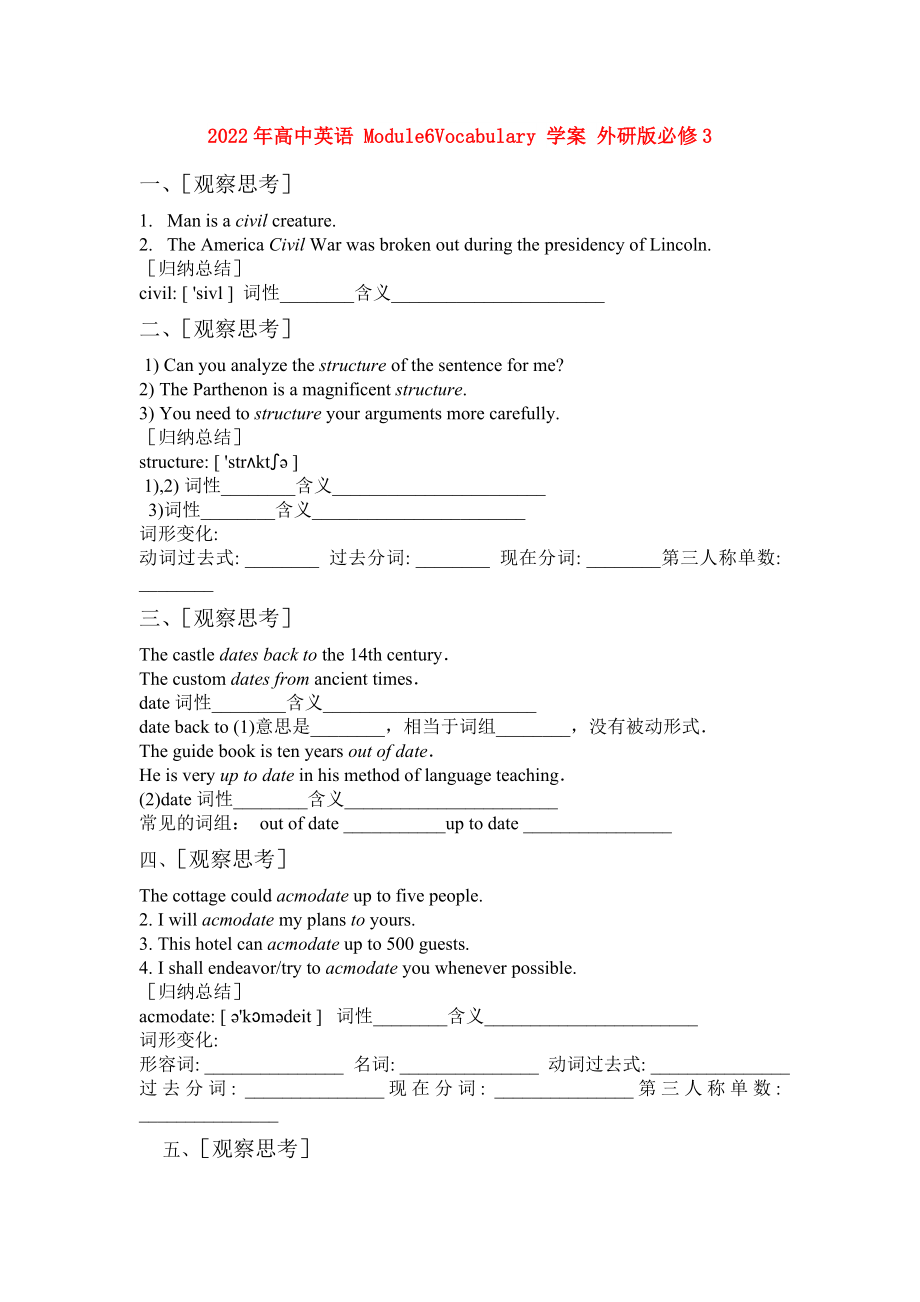《2022年高中英語(yǔ) Module6Vocabulary 學(xué)案 外研版必修3》由會(huì)員分享�,可在線(xiàn)閱讀,更多相關(guān)《2022年高中英語(yǔ) Module6Vocabulary 學(xué)案 外研版必修3(3頁(yè)珍藏版)》請(qǐng)?jiān)谘b配圖網(wǎng)上搜索���。
1�、2022年高中英語(yǔ) Module6Vocabulary 學(xué)案 外研版必修3
一��、[觀(guān)察思考]
1. Man is a civil creature.
2. The America Civil War was broken out during the presidency of Lincoln.
[歸納總結(jié)]
civil: [ 'sivl ]??詞性________含義_______________________
二����、[觀(guān)察思考]
?1) Can you analyze the structure of the sentence for me?
2) The Parthen
2、on is a magnificent structure.
3) You need to structure your arguments more carefully.
[歸納總結(jié)]
structure: [ 'str?kt?? ]?
?1),2)?詞性________含義_______________________
3)詞性________含義_______________________
詞形變化:
動(dòng)詞過(guò)去式: ________ 過(guò)去分詞: ________ 現(xiàn)在分詞: ________第三人稱(chēng)單數(shù): ________
三����、[觀(guān)察思考]
The castle
3、dates back to the 14th century.
The custom dates from ancient times.
date詞性________含義_______________________
date back to (1)意思是________�,相當(dāng)于詞組________,沒(méi)有被動(dòng)形式.
The guide book is ten years out of date.
He is very up to date in his method of language teaching.
(2)date詞性________含義_________________
4�����、______
常見(jiàn)的詞組: out of date ___________up to date ________________
四、[觀(guān)察思考]
The cottage could acmodate up to five people.
2. I will acmodate my plans to yours.
3. This hotel can acmodate up to 500 guests.
4. I shall endeavor/try to acmodate you whenever possible.
[歸納總結(jié)]
acmodate: [ ?'k
5��、?m?deit ]? 詞性________含義_______________________
詞形變化:
形容詞: _______________ 名詞: _______________ 動(dòng)詞過(guò)去式: _______________過(guò)去分詞: _______________現(xiàn)在分詞: _______________第三人稱(chēng)單數(shù): _______________
?五�、[觀(guān)察思考]
1. He became a construction worker after he left school.?
2. There are two new houses under construc
6、tion.
[歸納總結(jié)]
construction: [ k?n'str?k??n ]? ?詞性________含義_______________________
under construction含義_____________________.
類(lèi)似用法:under repair含義_____________, under treatment含義_____________
Several new railways are under ______ (建設(shè)) in China.
六����、[觀(guān)察思考]
This stone axe(石斧) is a relic of ancient
7、 times.
2. This ruined bridge is a relic of the Civil War.
[歸納總結(jié)]
relic: [ 'relik ] 詞性________含義_______________________
七���、[觀(guān)察思考]
1. The gate is too narrow for a car.
2. She has very narrow ideas about religion(宗教).
3. The heavy traffic crawled through the narrow tunnel.
[歸納總結(jié)]
narrow
8�、詞性________含義_______________________
八��、[觀(guān)察思考]
the historic first voyage to outer space.
May 4, 1919 is a historic day.
[歸納總結(jié)]
historic adj. _______________________
[觀(guān)察思考]
Millions of people from all over the country e to Beijing to tour the Imperial Palace and the Great Wall as well as other
9��、 world-famous historical spots(or sites)?during National Day holidays in every year.?
[歸納總結(jié)]
historical adj. _______________________
(1)There are lots of _________sites in Huimin County.
(2) The _________battle changed the fate of two nations.
(3)The TV San Guo Yan Yi is principally based on th
10�、e _________facts.
(4)According to the _________records, Zigui belonged to the Chu State.
(5)Launching Shenzhou-Ⅴ is a _________event in China’s Spaceflight history.
課堂檢測(cè)
Ⅰ.詞語(yǔ)判斷(共10小題;每小題1分,滿(mǎn)分10分)
1.These stone _________(雕刻)date back to Warring States Periods.
2.The new school is still under _
11、________(建設(shè)).
3. Chinese Oil Painting of Ming and Qing D are exhibited in Paris during the China-France Culture Year.
4.Many students took genetic and civil _________(工程學(xué))as their majors.
5. When coal burns, it g heat.
6. Some scientists are working hard at how tide can be h to pr
12��、oduce electricity.
7.Mr Thompson gave all the _________(歷史)papers of his grandfather to the public library according to his grandfather’s will.
8. The builders had put up a tall s between the shops.
9.Torrents of water rushed down the mountain and _________(淹沒(méi))the farmland.
10.The ________
13��、_(期終) examinations will be held in early May.
Ⅱ詞匯句型
1. Mr.Bovin is the kindest boss _________.I’m looking forward to working for him.
A. never found B. which was ever found
C. ever found D. once found
2. A great many visitors e to visit the church _________the 13th century, which
14�����、has brought large ine to the local government.
A. dated from B. dating from
C. which was dated from D. which dated from
3. I bought a new dictionary and it _________me 30 yuan.
A. paid B. spent C. took D. cost
4. .—One hotel is not enough, don’t forget we have 300 tourists
15、here.
—No, sir, this hotel can _________500.
A. seat B. contain C. include D. acmodate
Ⅲ.單句翻譯
1.長(zhǎng)城是有史以來(lái)最長(zhǎng)的人造工程����。
2.修建這條鐵路需要三年的時(shí)間�。
3.這家旅館能容納1000位旅客。
教師寄語(yǔ)
培養(yǎng)語(yǔ)感也就是說(shuō)我們應(yīng)多開(kāi)口說(shuō)話(huà)��、與人交流��。語(yǔ)感的培養(yǎng)是建立在對(duì)大腦良性刺激的基礎(chǔ)上的��,當(dāng)我們開(kāi)口說(shuō)話(huà)時(shí)����,我們的頭腦進(jìn)行了主動(dòng)的、積極的思維���,而且發(fā)出的聲音又構(gòu)成了對(duì)大腦良好的刺激����。此外�,當(dāng)我們能夠完整、正確����、流利地說(shuō)出一個(gè)復(fù)雜長(zhǎng)句時(shí)��,所帶來(lái)的成就感能夠促使大腦更為興奮�。這些都不是被動(dòng)閱讀所能帶來(lái)的�。所以我們?nèi)缦肱囵B(yǎng)語(yǔ)感,就應(yīng)多開(kāi)口�、多交流。即使閱讀時(shí)也應(yīng)在不影響別人的情況下多做些發(fā)聲閱讀�,當(dāng)然此時(shí)頭腦也應(yīng)該積極思維。
 2022年高中英語(yǔ) Module6Vocabulary 學(xué)案 外研版必修3
2022年高中英語(yǔ) Module6Vocabulary 學(xué)案 外研版必修3

